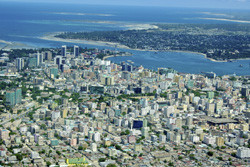Facing the threat of natural disasters
Urban Africa is vulnerable to the effects of natural disasters due to its fragile economies and the often-poor infrastructure in rapidly growing cities. Global climate change will only increase the risk in years to come. The 'Climate change and urban vulnerability in Africa' (CLUVA)(opens in new window) project developed methods for assessing and managing climate change-related risks. It aimed to help the continent's cities adapt to threats from the extreme weather conditions that are expected over the coming decades. Project members matched Europe's leading climate and risk management experts, urban planners and social scientists with their counterparts in Africa. The purpose was to increase the ability of scientific institutions, local councils and civil society to face the challenges of climate change. Partners studied five cities throughout the African continent to determine the environmental, social and economic impacts and risks of climate change. Addis Ababa in Ethiopia, Dar es Salaam in Tanzania, Douala in Cameroon, Ouagadougou in Burkina Faso and Saint Louis in Senegal were selected for the project. CLUVA built large-scale climate projections for Africa, and then scaled these predictions down to the level of individual cities. The downscaled models also took into account local geography, infrastructure and social conditions in each city. The models allowed researchers to predict areas of high risk and extreme vulnerability. In addition, CLUVA produced guidelines and tools for the cities to mitigate these risks. Strategies developed will enable cities to become more resilient to extreme weather events likely to affect vulnerable urban areas. They include heat waves, flooding, droughts, desertification and sea-level rise. CLUVA generated knowledge about the direct and indirect impacts of climate change and its spatial and temporal scales. This is set to benefit urban communities in Africa in particular, but also the rest of the world.







